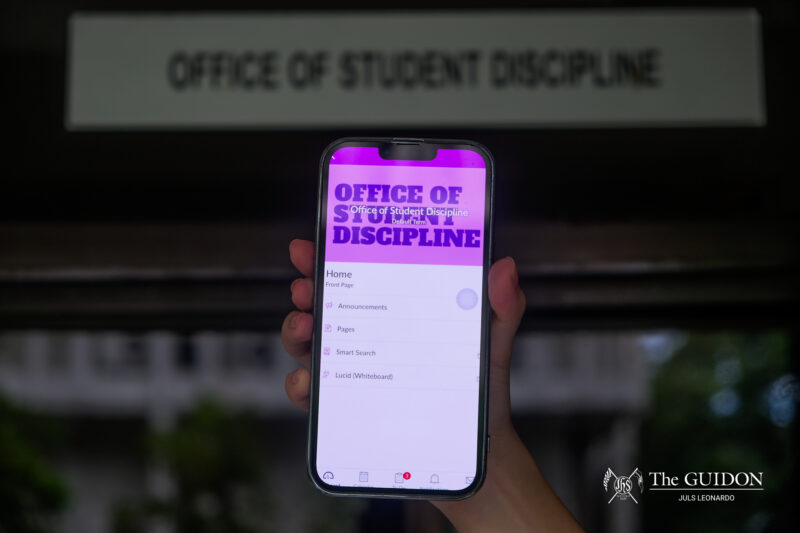FACULTY AND non-teaching staff have expressed their opposition to a road extension project that would link the New Rizal Library to the JSEC/Moro Lorenzo Football Field.
They released a statement urging the Campus Facilities Management Office to cease construction of any road that would cut through the School of Management (SOM) Forest as part of the New Rizal Library road extension project.
The joint statement expressed concern over the “encroachment of vehicular traffic” and its implications for the forest’s wildlife, which includes plants, animals, and fungi.
The document was released online last Friday, 12:00 NN. The list of signatories contains 188 names as of April 29, 7:28 PM, and “will continue to be updated.” Some administrators and Jesuit priests have notably signed the petition.
The University President and the Vice President for Administration have been furnished copies of the petition.
According to a memo from Vice President for Administration Nemesio S. Que, SJ, the road extension project has been postponed following an April 24 meeting with concerned Loyola Schools (LS) faculty members.
A presentation and discussion of the project will be held during the LS Council Meeting on Friday, May 4, 5:00 PM at the Faber Hall Multi-Purpose Hall.
The Sanggunian has also asked students to give their thoughts on the issue through social media by using the hashtag #UsapTayoLS. Concerns will be forwarded during the May 4 forum.
Preserving the SOM Forest
The statement said that the SOM Forest has become an “integral part” of the Ateneo community’s environmental heritage, as it serves as a space for “tranquility and quiet” and as home to plants, animals, and fungi.
It said that the SOM Forest is one of the most “actively used” green areas on campus. The petition said that the forest is one of the only walkways left that is insulated from vehicular traffic, and that it should not be compromised for the “indulgence of motorized vehicles.”
While the statement acknowledged Ateneo’s mobility challenges, it stated that the road extension project does not “[represent] the developmental ideals” of the University.
The statement also noted that the introduction of a road will not be “consistent with” ideals such as protecting the environment, sustainable development, conserving green spaces, and promoting ethical mobility.
It said that the project cannot be justified by “equating development with more roads” when developed places “eschew cars” to prioritize pedestrians.
The statement also called for alternative mobility solutions that will not harm the forest’s flora and fauna for the sake of prioritizing vehicular traffic.
An April 14 memo from Architect Michael Canlas, Director of the Facilities Management Office, assured the University that the tree movement activities related to the project were done in accordance with law.
Asked for an interview to discuss the road extension project further, Canlas and Abigail Favis of the Ateneo Institute of Sustainability both referred The GUIDON to the May 4 forum.
Que has yet to formally reply to The GUIDON’s interview request.
Benefit of road ‘too small’
Kardi Teknomo, PhD of the Ateneo Pedestrian and Traffic Computing Laboratory and the Information Systems and Computer Science Department, conducted a study on the road extension project.
Results of his simulation showed that a two-way road from the New Rizal Library to JSEC/Moro Lorenzo Football Field would only improve the current road network’s average speed by 0.03%, while a one-way road would increase this by 0.01%.
Adding a two-way road or a one-way road would also increase the median travel time per kilometer from 90.96 to 91.01 seconds.
With the new road, total travel time around the network would increase from 18.20 minutes to 19.05 and 18.62 minutes on a two-way and one-way road, respectively.
He also said that the proposed road would likely end up congested, and its use would result in a significant delay and longer travel time.
Teknomo, a signatory to the statement, said that his traffic simulation showed that the road’s benefit is “too small” compared to the costs of the project. He said that the project would only benefit those who use cars, and that the projected congestion of the road extension could lead to future road widening proposals.
He also noted that the forest provides protection against air pollution and noise from Katipunan traffic.
As alternative solutions, Teknomo suggested building more walkways, planting more trees, and declaring the LS a car-free campus.
‘Terrible trade-off’
Mary Racelis of the Institute of Philippine Culture and the Sociology and Anthropology Department said that the project would deprive the community and its campus of a “people-friendly space.”
Racelis, a signatory of the petition, emphasized the importance of the SOM Forest as a haven of nature that provides shade from the sun and serves as a quiet area. She said that replacing this with more concrete surfaces and enduring added heat for a road “that could be built elsewhere” is a “terrible trade-off.”
“How can the Ateneo as a highly regarded protector of our natural environment go ahead on this project, given the objections, without wider consultation for alternate solutions?” she said.
Racelis suggested discussing the topic in the next Faculty Forum before the end of the semester.
Policy recommendations
Teknomo also cited a 2012 report on campus mobility conducted by the Ateneo Traffic Group, which includes alternative solutions to increase efficient campus mobility.
Among these are recommendations to optimize community cooperation for a walkable Katipunan, create a car-park building, create car free-zones, improve the carpool system, and to set up a system for pay parking.
It also recommended creating more access points and increasing the gap between schedules of the different University units.
The creation of a shuttle service from strategic hubs was also suggested in the report. This was fulfilled when Ateneo launched its own shuttle service on June 20, 2016, in partnership with the Metro Manila Development Authority.







